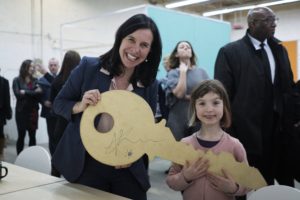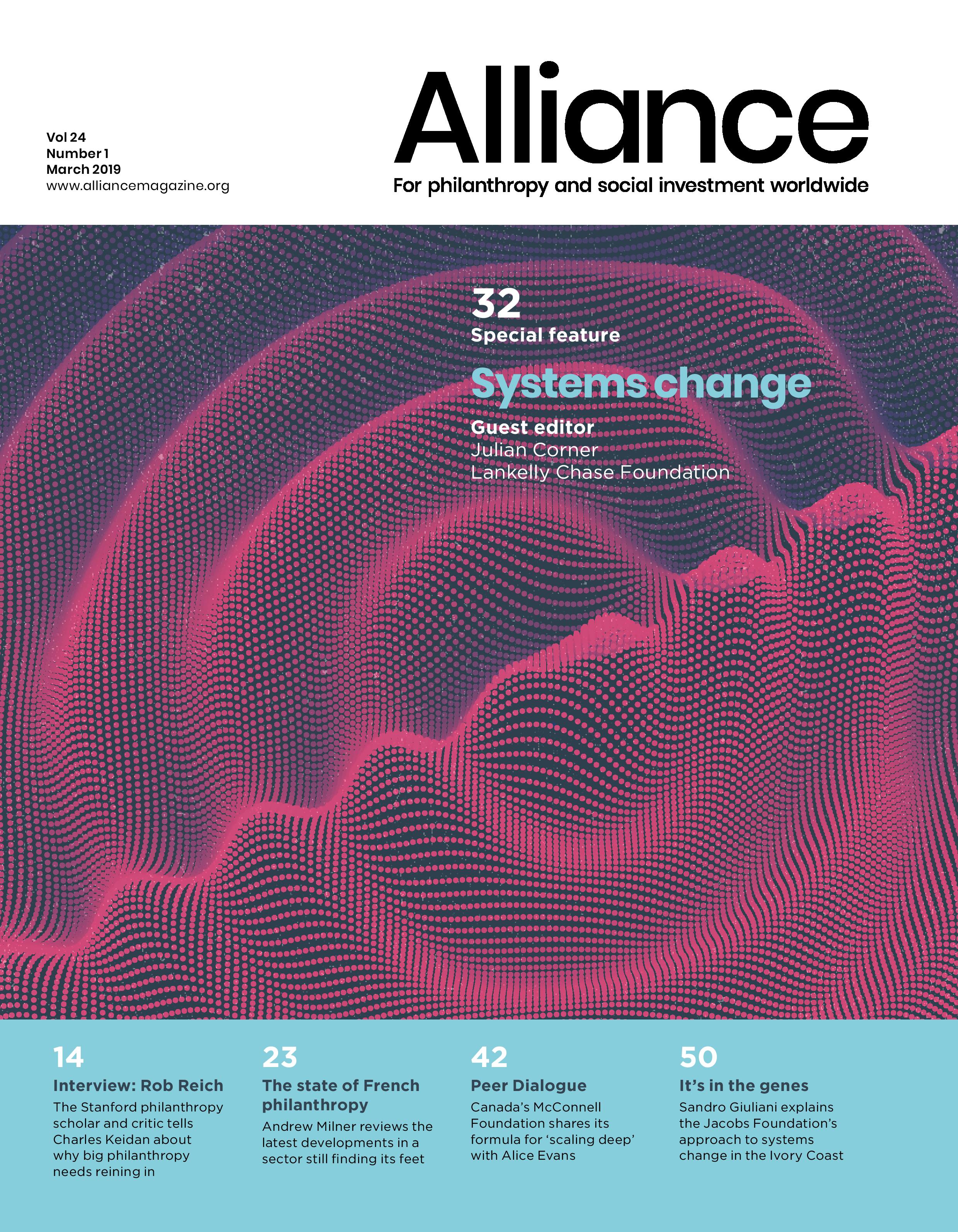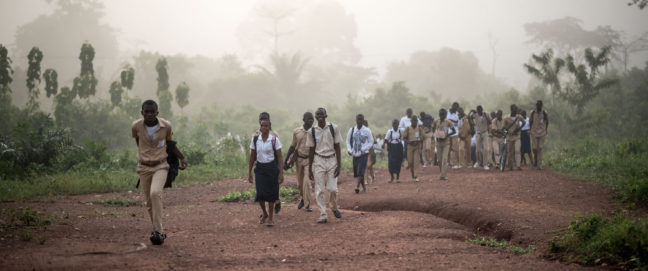Lankelly Chase Foundation’s Alice Evans talks to Stephen Huddart and Darcy Riddell of the McConnell Foundation in Canada about how a systems change approach has led them to reconsider not only the way they think and work as an organisation, but their attitudes as individuals
Alice: How did the McConnell Foundation come to this systems change approach?
Stephen: My predecessor, Tim Brodhead, realised that philanthropy alone wasn’t enough to create change at scale, that it needed a different relationship with other sectors. Eventually the Foundation formed a working partnership with a private sector incubator and commercialisation institute called MaRS Discovery District, the Waterloo Institute for Social Innovation and Resilience (WISIR) and the PLAN Institute in Vancouver, which looks at questions of disability rights and citizenship. It was from this that SiG (Social Innovation Generation)[1] arose. That type of loose partnership with organisations that were quite different from us created the space for research, experimentation, learning and testing. We often describe SiG as a secondary operating system for the Foundation. But even before that the Foundation was looking at how promising new ideas could be supported from idea to scale in terms of a broader impact but also in terms of the organisation’s own capacity to go deeply into an issue.
Darcy: Frances Westley of WISIR was researching grantees’ experiences so we got into a learning relationship with those grantees and were able to see what underlay their practice and some emerging patterns. We identified that they were involved in replication or scaling out of programmes and then scaling up advocating to change laws and policies. But we were also seeing different kinds of practice for scaling in both of those ways that were looking at changing hearts and minds and at the profound role that culture plays in maintaining our systems. So the idea of scaling deep really came from learning what the changemakers that we were supporting were doing to influence the personal transformations that people go through in their relationship with issues, deeper societal values, and with the institutions that define our world. Scaling Up, Scaling Out, Scaling Deep is the paper that captured that.
Current evaluation practice often extracts knowledge from communities so Foundations can feel they are having an impact, but it reinforces power imbalances and doesn’t work well from a systems perspective.

The key to a city building in Montreal was handed over by Mayor Valérie Plante after collaboration with McConnell grant partner Entremise. Photo: Jérémie Battaglia
Stephen: The idea of scaling deep helped us to recognise that we were part of the very systems that we were attempting to change and that unless we examined our practices, we would unconsciously perpetuate things that were antithetical to our larger purpose. That opens up the conversation about how we deploy our assets – staff, grants, convening capability and the endowment – to advance the changes we’re seeking. It was also an important precondition for our work on Indigenous reconciliation. Canada’s Truth and Reconciliation Commission has begun to reveal the true history of colonisation, subjugation and even genocide. A scaling-deep perspective helps you to engage empathetically in the healing process and to recognise that Indigenous reconciliation is not just for Indigenous people, we’re half of that relationship. So a big part of the systems change work that we’re doing is the cultural shift we’re engaging in. Rather than reconciliation being a programme of the Foundation, we recognise that everything we do, from governance to investment to our work on cities or education, needs to take account of and seek ways for building meaningful partnerships, continued learning and bold experimentation. That comes out of scaling deep. Frankly, I think we miss that in our sector. Scale is often equated with size and speed at which new ideas spread, but there is a quiet human dimension to this which we need to bring into focus.
You make it sound easy, but actually it’s really difficult, particularly when you’re applying that approach across all aspects of your work. What’s helped you?
Stephen: We’ve made a conscious effort to incorporate learning and reflection into our philanthropic practice, so retreats, time spent on the land, inviting outsiders to speak to us. And the investments we make in the very small and under-addressed populations, so finding ways to be with Indigenous people in the case that we’re talking about, to listen first, and go into deeper listening. We have an Indigenous person running that portfolio, Indigenous advisers on many initiatives and Indigenous partners across the grantee portfolio.
Darcy: Having an explicitly systems or complexity-oriented view has helped the practice, but the trustees have been very willing to support that work. That’s the benefit of an older, more mature family Foundation and we have done the work to bring the board along, which creates an important authorising environment for taking risks. There’s a lot of big, new money in philanthropy looking at splashy impact, whereas I think there is a benefit in being part of a longer-standing family Foundation that understands that relationships evolve and that patience is required.
But this work is disruptive, we’re not just here to support the status quo. So while we respect those who are experts or who have the relationships, we’re hoping to be able to gently open up that space for new possibilities and better outcomes.
Stephen: One of the jurors on the Truth and Reconciliation Commission, Justice Sinclair, was at the first Indigenous Innovation Summit that we worked on and he said, ‘innovation is not just about new things, it’s also about bringing the past into the present to serve the current situation’. That was another ‘Aha!’ moment for us. Particularly for the reconciliation work, we need to understand how we got here. Systems change funders need to engage multiple interests on the issues they work on and that requires broad understanding of many aspects of human thought and behaviour – the desire, aspirations, anxieties and frustrations. So there’s a human side to this work on Indigenous reconciliation that informs the rest of what we do.
What does all that mean for your structures and your internal skillsets?
Darcy: Initially, having a learning partnership with a practical academic helped to create a systems thinking framework internally. I had done my PhD in that kind of lineage and framework so I was steeped in both the theories and practice of systemic change. But many new programme staff have both shaped and inherited some of this audacious vision. Over the past 15 years, we’ve moved from writing cheques and building relationships with grantees to more strategic philanthropy and some of what has occurred is really collective sense-making. We’re at another phase where that is important because we have now seven or eight robust initiatives in different domains, and social innovation methods and systems practice cut across all of them.
I’ve spent the last couple of years thinking about what comes next. Social innovation and some kinds of systems practice are now thriving in Canada, so different kinds of capacity are needed, one of which is the ability to help learn and make sense with all the many people involved in a change initiative. Current evaluation practice often extracts knowledge from communities so Foundations can feel they are having an impact, but it reinforces power imbalances and doesn’t work well from a systems perspective. One of the questions I hold is, ‘what does it mean for the locus of learning to be the system itself?’, and use this to better engage our partners, collaborators and communities in learning and ongoing strategy development.
Stephen: On Darcy’s point about embedding the learning in the practice, something we’ve learned by doing, is with SiG, we could see a gap between the intellectual and academic discourse and the theoretical constructs around social innovation. To try and bridge that, we created a learning platform called Innoweave which was supposed to be about putting the tools and mindsets of social innovation into the social sector. We’ve learned a lot from doing that, so Innoweave is moving from a platform that offered modules on developmental evaluation, outcomes finance, scaling and so on, to one that looks at how the public sector and civil society can better collaborate. Because our work on systems change has led us to realise that, if we want to build better systems, we have to be working closely with the public sector. That’s an example of putting a learning platform in place around a systems change effort and I think we can be a lot better at that.
We’ve done that in other parts of the work. It may look like just putting up a website but we can start to harvest learning papers, point to the work of others and grow a learning space around an initiative. We also have the Twelve Lessons discipline, which we started three years ago, reflecting over the course of the year on what the main lessons were that we’d learned. We shared these and we’re just releasing Twelve Lessons Shared from some of our partners. They are another way for us to learn through the work. We also share retreat space with several other Foundations, Wasan Island, where people come together for three or four days, which is instrumental to our ability to work on systems change. We also participate in the Academy for Systems Change, and in other global networks.
The last 15 years of this Foundation have been a patient and purposeful exploration of what it means to work on systemic change. So find your friends and your partners and get started but don’t expect it to happen overnight.
Darcy: Learning communities and convenings where people are able to build trust, share fears and co-create was one of the ways that our partners used to scale and replicate their own work. So we know the transformative effect of learning together and thinking together. Wasan Island is a place that we use to foster that kind of connection and shared purpose with people like you, Alice, and Lankelly Chase Foundation, the Garfield Foundation and Omidyar Foundation, and others involved in trying to build the global field of systems change practice.
What implications does your approach have for recruitment? Do you need different staff or is it more a matter of existing staff developing different skills? Your approach also sounds like you’re navigating being a funder, a partner and a strategic actor. How do you balance those different roles?

A community space for spontaneous interaction in downtown Montreal, the result of a project by McConnell grant partner La Pépinière. Photo: Steven Porotto
Stephen: We increasingly try to practise an integrative approach to our work so as to overcome some of the disciplinary silos that often prevent systems learning. We consciously go outside of the Foundation to appoint or invite fellows, younger people with a real spark and passion for this work. We’ll find a way to have them come and spend a year here. We also go to people who are in mid-career transition. It’s often a great time to get somebody who has expertise in an area or who’s got a particular question they’d like to pursue. That’s helping us expand our human resource. But we’re also doing staff exchanges. Somebody from the government’s innovation unit came initially with the intent of staying a year and at the same time somebody from Imagine Canada, the umbrella organisation of the charitable sector in Canada, went to the same unit in government. So there was a three-way exchange, and the two people involved were able to translate the language and cultural differences that they encountered during a period of restructuring the relationship between the two sectors. That kind of porousness is important to the work we’re doing now. Building or joining ecosystems partnerships is central to the way we think and act. We’re working at scale with people and institutions already present in the system and using our ability to convene, connect and otherwise enable relationships to deepen and for this work to become visible.
We sometimes get pushback about whether we should be taking this role as a Foundation – are we using our power in the right way? Does that happen to you?

Through impact investing, the McConnell Foundation supports the Aboriginal Savings Corporation of Canada’s work to improve access to housing loans for First Nations people. Photo: ABSCAN
Stephen: Sometimes we get challenged by civil society organisations who view this kind of work as disruptive of existing relationships or commitments. But this work is disruptive, we’re not just here to support the status quo. So while we respect those who are experts or who have the relationships, we’re hoping to be able to gently open up that space for new possibilities and better outcomes. Our main current challenge is over the deployment of our endowment. We see ourselves as being fairly progressive about how we invest but we haven’t divested from the energy sector, partly because we work with that sector on Indigenous issues for example, or with the funding of the Energy Futures Lab. The energy sector isn’t a monolithic dark force, it’s a diverse and human system that we would like to engage with, not demonise. We’re all implicated in it because we all drive to work or take the bus or whatever and I resist the easy symbolic gesture that divestment sometimes looks like.
Darcy: We have vigorous debates inside the Foundation about this. I would like to see us divest. But Stephen’s right, we’re all implicated in the systems. We can’t continue an approach to social change that isn’t at the scope and scale required for us to continue to survive on the planet into the 22nd century and to thrive. We need to do things differently and that has to involve all sectors and institutions.
Has this process that you’re engaged in over the last 15 years – learning and responding – been a break with what went before, or is it a continuation of what has been going on since the Foundation was set up?
Stephen: Philanthropy and its civil society partners have this role of enabling thought and experimentation around some of our most perplexing challenges, and for the last 15 years the Foundation has been interpreting that mandate around our current challenges of sustainability, social inclusion and equity. We use the term resilience, it really refers to community and ecological well-being at all levels, while also looking at how to improve our own philanthropy toolkit, learning from others and contributing to that learning about how we do this at a time when it’s crucial that we do it well and involve others.
Darcy: I think one of the core elements of our practice is this commitment to adapting and transforming… in emergent conditions.
What would be your advice to other Foundations starting on the journey you’ve made?
Stephen: We all have to start from wherever we find ourselves. We tend to overestimate what we can achieve in the short term and underestimate what we can achieve in the medium term. The last 15 years of this Foundation have been a patient and purposeful exploration of what it means to work on systemic change. So find your friends and your partners and get started but don’t expect it to happen overnight.
Darcy: It can be hard for Foundations to start so in 2018 we launched SUSI – Systems Understanding for Social Impact – with the Robert Wood Johnson Foundation and UK Health, which you’re part of as well, Alice. We’re trying to create a space where we can learn from some of the more mature practices, like Garfield’s systems work and Omidyar’s work and Lankelly’s, and share some of our own learning about funding and co-creating systems change. It’s a combination of Foundations that are deeper into their practice and some that are newer but really embracing it, like Mastercard Foundation. We intend to share our learning from it more widely. I have a lot of faith that something like that can help build the field.
Stephen Huddart is CEO and Darcy Riddell is director of Strategic Learning at the McConnell Foundation (Canada).
Alice Evans is deputy CEO of Lankelly Chase Foundation.
Email alice@lankellychase.org.uk
Twitter @alicemevans
Footnotes
- ^ SiG, or Social Innovation Generation, aims to be a catalyst for supporting whole system change by contributing to changing the broader economic, cultural and policy context in Canada so that social innovations can flourish.




Comments (0)